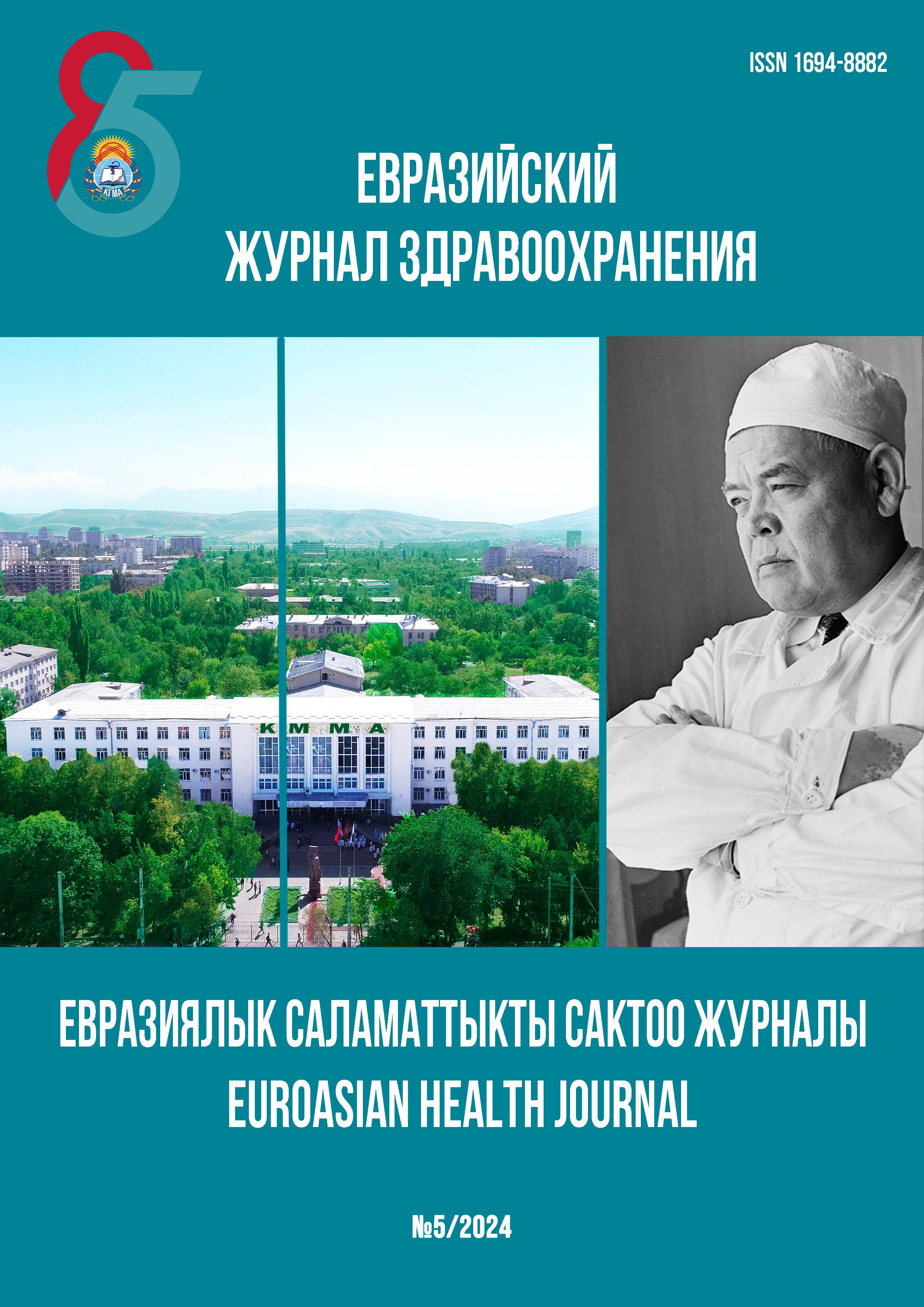PREVALENCE OF COGNITIVE IMPAIRMENTS IN ELDERLY PATIENTS WITH ARTERIAL HYPERTENSION
DOI:
https://doi.org/10.54890/1694-8882-2024-5-50Abstract
The evolution of cognitive impairment of vascular origin is becoming an increasingly prominent health threat, especially in this era when hypertension is a leading contributor to the global burden of disease and overall health loss. Hypertension is associated with altered cerebral microcirculation coupled with adverse vascular remodeling, with subsequent slowing of mental processing speed, reduced abstract thinking, loss of language abilities, and deficits in attention and memory. Due to the rapidly increasing burden of hypertension in Kyrgyzstan, we assessed the prevalence and correlates of cognitive impairment among hypertensive patients admitted to the Bishkek Clinical Multidisciplinary Hospital No. 1. The present study highlights that cognitive decline is significantly prevalent among individuals with systemic hypertension. More than two-fifths of the hypertensive participants in this present study had cognitive impairment. There is a wide variability in the prevalence of cognitive impairment (16.5–63.9%) among hypertensive individuals in the literature, but our rate is in the middle. This discrepancy in prevalence may result from differences in population characteristics and variability in the instruments used to assess cognitive function across studies. It is therefore imperative to include cognitive assessment in the routine evaluation of hypertensive patients.
Keywords:
arterial hypertension, elderly people, cognitive impairmentReferences
1. Leung AA, Daskalopoulou SS, Dasgupta K, McBrien K, Butalia S, Zarnke KB, et al. Hypertension Canada’s 2017 guidelines for diagnosis, risk assessment,prevention, and treatment of hypertension in adults. Can J Cardiol. 2017;33(5):557–576. https://doi.org/10.1016/j.cjca.2017.03.005
2. Forouzanfar MH, Liu P, Roth GA, Ng M, Biryukov S, Marczak L, et al. Global burden of hypertension and systolic blood pressure of at least 110 to 115 mm hg, 1990-2015. JAMA. 2017;317:165–82. https://doi.org/10.1001/jama.2016.19043
3. Whitworth JA; World Health Organization, International Society of Hypertension Writing Group. 2003 World Health Organization (WHO)/International Society of Hypertension (ISH) statement on management of hypertension. J Hypertens. 2003;21(11):1983-1992. https://doi.org/10.1097/00004872-200311000-00002
4. Hughes TM, Sink KM. Hypertension and Its Role in Cognitive Function: Current Evidence and Challenges for the Future. Am J Hypertens. 2016;29(2):149-157. https://doi.org/10.1093/ajh/hpv180
5. World Health Organization. Global action plan on the public health response to dementia 2017–2025. Geneva: World Health Organization; 2017. Available from: https://www.who.int/publications/i/item/global-action-plan-on-the-public-health-response-to-dementia-2017---2025
6. Faraco G, Iadecola C. Hypertension: a harbinger of stroke and dementia. Hypertension. 2013;62(5):810-817. https://doi.org/10.1161/HYPERTENSIONAHA.113.01063
7. Hugo J, Ganguli M. Dementia and cognitive impairment: epidemiology, diagnosis, and treatment. Clin Geriatr Med. 2014;30(3):421-442. https://doi.org/10.1016/ j.cger.2014.04.001
8. Iadecola C, Gottesman RF. Neurovascular and Cognitive Dysfunction in Hypertension. Circ Res. 2019;124(7):1025-1044. https://doi.org/10.1161/CIRCRESAHA. 118.313260
9. Bucur B, Madden DJ, Spaniol J, Provenzale JM, Cabeza R, White LE, et al. Age-related slowing of memory retrieval: contributions of perceptual speed and cerebral white matter integrity. Neurobiol Aging. 2008;29(7):1070-1079. https://doi.org/10.1016/j.neurobiolaging.2007.02.008
10. Meschia JF, Bushnell C, Boden-Albala B, Braun LT, Bravata DM, Chaturvedi S, et al. Guidelines for the primary prevention of stroke: a statement for healthcare professionals from the American Heart Association/American Stroke Association. Stroke. 2014;45(12):3754-3832. https://doi.org/10.1161/STR.0000000000000046
11. Birhanu TE, Kassa MA, Getachew B, Dereje D, Gerbi A. Prevalence and predictors of cognitive impairment among hypertensive patients on follow up at Jimma University medical center, Jimma, Southwest Ethiopia. EJCM. 2019; 7(3): 117–25. https://doi.org/10.32596/ejcm.galenos.2019.05.031
12. Тажибаева У.Ж., Арстанбекова М.А., Мусакеев А.К. Нартаева А.К., Иманалиева Ф.Э., Маматов С.М. Патофизиологические аспекты и лечение дефицита железа у пожилых людей (обзор литературы). Вестник КГМА им И.К. Ахунбаева. 2023;2:65-72. https://doi.org/10.54890/1694-6405_2023_2_65







